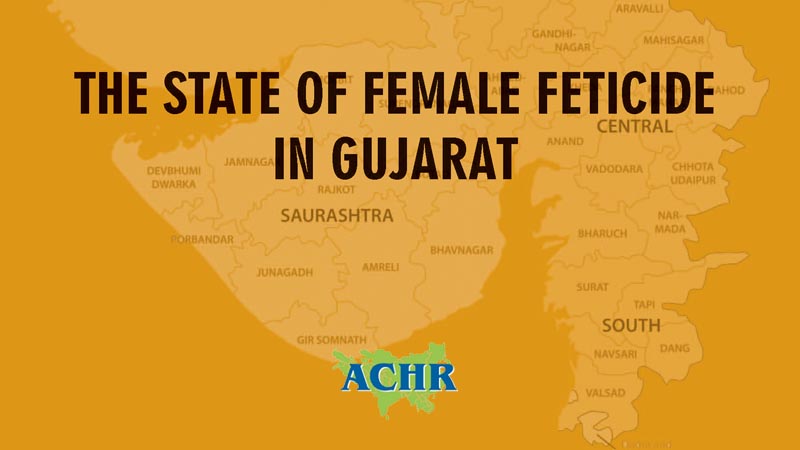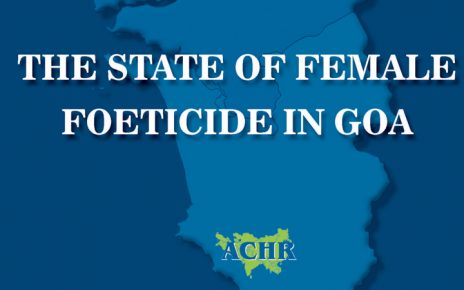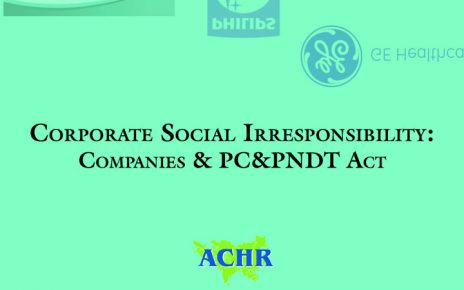A total of 4,29,225 girls altogether went missing during 2001 and 2011 in the age bracket of 0-10 years in Gujarat according to Census 2011 and Gujarat recorded the 8th lowest Child Sex Ratio (CSR) among 35 States and UTs of India with CSR of 890 girls per 1000 boys against all India average CSR of 919.
With exception of 1981 Census, Gujarat has been registering a declining trend of CSR since 1971. In Gujarat, the CSR was 946 as per 1971 census; 950 as per 1981 census; 928 as per 1991 census; 883 in 2001 census. It improved to 890 in 2011. In terms of points, from 1981 to 2011, the CSR actually fell by 60 points. 17 out of 26 districts recorded CSR below national average CSR of 919 while 7 out of 26 districts recorded CSR below the state average CSR of 890 girls per 1000 boys.
An analysis of the sex ratio at birth (SRB) data in Gujarat during the decade 2005- 2014 as recorded under the Civil Registration System by the Office of the Registrar General of India, Ministry of Home Affairs, Government of India suggests that Gujarat is in fact gradually reverting back towards 2005 position when the SRB was 846. The SRB increased by 126 points from 846 in 2005 to 972 in 2006, then declined by 93 points recording 879 in 2007 and again improved marginally by 4 points recording 883 in 2008. The SRB however remained consistent for five years recording 905 in 2009, 902 in 2010, 901 in 2011, 902 in 2012 and 901 in 2013. But it slide back by 15 points recording 886 in 2014. If the existing under-five mortality rate (U5MR) of 48 deaths per 1,000 births in India is applied in Gujarat context, the Child Sex Ratio (CSR) of 890 as per 2011 Census will come down much below.
The use of technology for sex selection is one of the root causes for drastic and consistent fall in the CSR in Gujarat.
Contrarily, the implementation of the PC&PNDT Act suffers from absolute lack of seriousness on the part of the PC&PNDT authorities in Gujarat. This has been substantiated by the fact that as of December 2015, the authorities in Gujarat filed only 349 court cases. Further, out of total of 187 disposed off cases, conviction was secured only in nine cases (4.81%) while 178 cases (94.17 %) resulted in acquittal. During the same period only 18 sting operations were carried out across the State.
The failures on the part of the Gujarat PC&PNDT authorities as pointed out by Office of the Comptroller & Auditor General (CAG) of India in its report on “General and Social Sector for the year ended March 2014” (Report No. 6 of 2014) included: (i) Deliberately not utilizing the e-Mamta portal and not monitoring and tracking antenatal & delivery cases registered under it, (ii) Mass media such as TV and Radio not effectively used for Information, Education and Communication (IEC) activities; (iii) Shortfall in inspection of clinics; (iv) Ultra-sonography machines not sealed or seized after cancellation of registration of clinics; (v) Negligible number of convictions and in ordinate delay in disposal of cases; (vi) No. of successful sting/decoy operations negligible because of lack of monitoring; (vii) No action taken against manufactures/suppliers/dealers of USG machines for violations of the PC&PNDT Act; and (viii) No action taken against clinics that failed to submit form ‘F’ online or as per the revised format.
As per the reply of the Minister of State in the Ministry of Health and Family Welfare, Smt Anupriya Patel in the Lok Sabha to Unstarred Question No. 1116 answered on 21st July 2017, there are 5465 centres registered under the PC&PNDT Act in Gujarat as of March 2017. The Minister further stated that as of March 2017, 17 convictions have been secured and there was no ongoing court or police case under the PC&PNDT Act and not a single machine has been seized or sealed.
The schemes implemented by the State Government of Gujrat hardly had any visible impact because of the fact that benefits given under these schemes are to less to act as incentives. The Balika Samridhi Yojana (BSY) launched by the Government of India in 1997 but continued be implemented by the State Government had extended post birth grants to only 4,24,007 beneficiaries and scholarships to only 1,50,096 beneficiaries against total expenditure of Rs. 14.65 crore as of October 2009.
Similarly, the Beti Bachao Abhiyan (BBA) also known as Dikri Bachao Campaign was launched by former Chief Minister Mr. Narendra Modi on 5 December 2005 in view of the skewed CSR of 878 by Gujarat in the 2001 census provided only a grant of Rs.6000/- to a family having one daughter but no son and only Rs.5000/- to a family having two daughters but no son. The financial aid of Rs. 6000 or Rs.5000 was too meager to act as incentive for retention of the girl child.
The Kuvar Bai Nu Mameru (KBNM) scheme was initiated in 1995-96 with the objective to help poor families belonging to Scheduled Castes/Tribe s and other backward classes at the time of marriage of their daughter has not been effective either mainly because of meager amount of Rs. 5,000 as financial assistance to the bride’s family. The amount of financial assistance was increased to Rs.10,000 in 2010.
In the light of these, Asian Centre for Human Rights recommends the following to the State Government of Rajasthan:
- Revise Balika Samridhi Yojana (BSY) or Beti Bachao Abhiyan (BBA) to increase the amount for post birth benefits of at least Rs. 1 lakh, provide educational scholarship of Rs. 50,00018 and further additional financial assistance of Rs. 1 lakh to be paid to surviving girls for assistance during marriage;
- Expand the coverage under BSY and BBA to include families irrespective of income;
- Undertake specific programme for increasing coverage of all families under the BSY and BBA schemes by connecting the programme with all hospitals;
- Upload all details of physical and financial achievements of the BSY and BBA schemes on a dedicated website and update the website regularly to provide all relevant information such as list of beneficiaries, funds sanctioned and utilization certificates; and
- Ensure proper implementation of the PC&PNDT Act inter alia by (i) properly monitoring and tracking of antenatal and delivery cases utilizing the e-Mamta portal, (ii) effectively using mass media such as TV and Radio for Information, Education and Communication (IEC) activities for wider reach out; (iii) conducting regular inspection of USG clinics; (iv) taking appropriate actions with USG machines after cancellation of registration of clinics; (v) strengthening the PC&PNDT apparatus to secure convictions and ensure time bound trial of PC&PNDT cases; (vi) conducting sting/decoy operations regularly by launching Mukhbir Yojana like Rajasthan; (vii) taking appropriate actions against manufactures/suppliers/dealers of USG machines found violating the PC&PNDT Act; and (viii) taking stern actions against clinics that failed to submit form ‘F’ online or as per the revised format and ensure they comply with the relevant provisions strictly; (ix) install tracking devices in each of the USG machines operated in the registered clinics; (x) making necessary budgetary allocations for implementation of all these measures.




